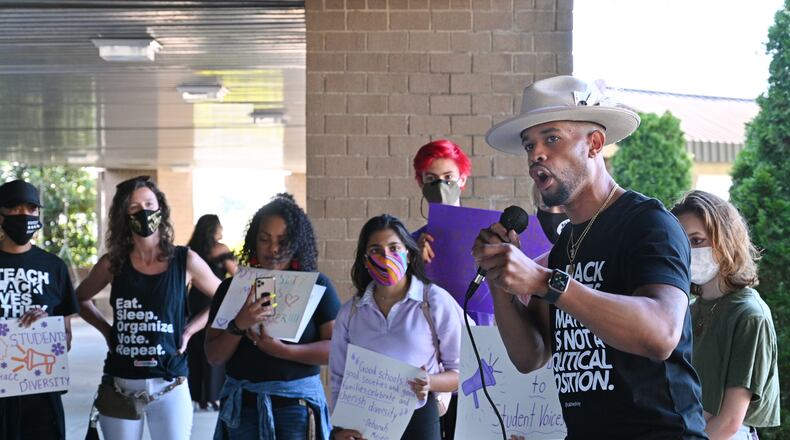Nearly two dozen students and teachers gathered Thursday morning to deliver a petition in support of teaching diversity, equity, and inclusion in schools to the Georgia Board of Education and to Gov. Brian Kemp.
The group, organized by CivicGeorgia, opposed the state Board of Education’s resolution to limit classroom discussions of race.
They delivered their petition, which has nearly 7,000 signatures, to the Board of Education, then rallied outside its offices.
Aryani Duppada, 17, is a student in Forsyth County who came to the rally Thursday to voice support for equity being taught in state schools.
“I have so many opportunities, but I have to work twice as hard for those opportunities, and ignoring this in the classroom is not right,” Duppada said. “I promise you, students of color and women of color know that we have to work harder. It’s important for other kids to know that too,” she said.
Duppada talked about her experience as an immigrant from India, and why diversity and equity training belong in schools.
“Imagine a little brown kid hearing, ‘Do you have a gun with you?’ and ‘Are you going to blow up the school?’ from their friends,” she said. “They say they’re just jokes, but it’s not just jokes. I’ve seen blatant racism, and I’ve heard slurs being yelled by my white peers.”
The ed board’s five-page resolution says schools should not teach that anyone is “inherently racist, sexist, or oppressive” just because of their race or gender or is responsible for past acts by people of the same race or gender and that no one “should feel discomfort, guilt, anguish, or any other form of psychological distress on account of his or her race or sex.”
In a statement June 3, Kemp applauded the board for their opposition to teaching Critical Race Theory and “for making it clear this dangerous, anti-American ideology has no place in Georgia classrooms.”
Critical race theory, developed in the 1970s, seeks to highlight how racism influences all aspects of society and how past systemic inequities continue to shape policies.
The resolution did not directly address critical race theory, but it seemed to address many of the concerns held by groups opposed to teaching it in schools.
Ryan Limings, 16, is also a student from Forsyth. He attended the rally in support of critical race theory as well. “Everyone deserves to hear the actual history of things. You’re never going to move past things if you don’t actually know what happened. A lot of people are against it because they think we’ll make white people feel bad for being white, but that’s not what it is,” he said.
Limings also said that many important historic events are often absent from a school’s curriculum
“I didn’t know about the Tulsa Race Massacre until this current movement of BLM,” he said. “I had the privilege of learning about police brutality late in life instead of experiencing it.”
Alfred Shivy Brooks teaches high school in Atlanta, and supports the movement.
“I teach economics. I would be doing a disservice to my students if I did not educate them to the barriers that happened in our society, and help them to understand how to curtail them, to prevent them, go over them, and go around them,” Brooks said.
Critical race theory has faced opposition in several metro counties, including Cherokee, Cobb, and Forsyth.
After the rally outside of the education board office, the group headed over to the state capitol where they delivered their petition to Kemp’s office.
About the Author
Keep Reading
The Latest
Featured



